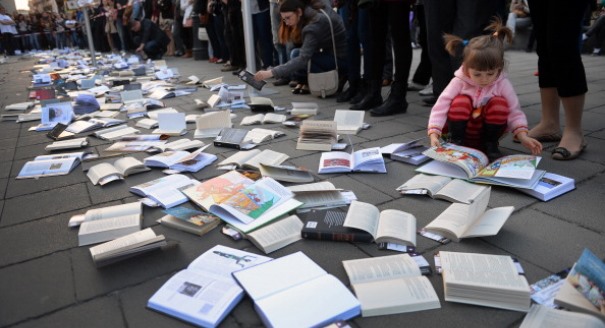Judy Dempsey
{
"authors": [
"Judy Dempsey"
],
"type": "commentary",
"blog": "Strategic Europe",
"centerAffiliationAll": "",
"centers": [
"Carnegie Endowment for International Peace",
"Carnegie Europe"
],
"collections": [],
"englishNewsletterAll": "",
"nonEnglishNewsletterAll": "",
"primaryCenter": "Carnegie Europe",
"programAffiliation": "",
"programs": [],
"projects": [],
"regions": [],
"topics": []
}
Source: Getty
What Are You Reading?, July, 15, 2013
Time for Strategic Europe’s annual summer reading suggestions! Carnegie Europe has asked a cross section of diplomats, policymakers, and analysts to share their favorite books.
Time for Strategic Europe’s annual summer reading suggestions! Carnegie Europe has asked a cross section of diplomats, policymakers, and analysts to share their favorite books.
Steven ErlangerParis bureau chief, soon to be London bureau chief, New York Times
Nonfiction
Assassins of the Turquoise Palace by Roya Hakakian. A deep look at the murders in Berlin, ordered by Ayatollah Khomeini, of Iranians opposed to the Islamic Revolution. Hakakian examines the roots of the regime as well as the reaction to the murders by Germany, which was dragged into providing justice.
Fiction
All That I Am by Anna Funder. The story of the London murders of political opponents of Hitler, fictionalized with elegance by the author of Stasiland.
Book from your home country (United States)
Anything by James Salter, who has just published another novel: All That Is.
Guilty pleasure
Capital by John Lanchester. A very enjoyable Balzac-wannabe novel about booming London, spun from the tales of those living and working on a street of overvalued houses.
Jamie SheaDeputy assistant secretary general for emerging security challenges, NATO
Nonfiction
The Lights that Failed and The Triumph of the Dark, both by Zara Steiner. These two volumes trace European history from the Paris Peace Conference in 1919 to the outbreak of the Second World War in 1939. They are a tour de force and, to my mind, the best account of Europe in the interwar years. Steiner has a great talent for assessing how one event impacts on another as she does not pull her punches when assigning political and moral responsibility for statesmen’s failures. But she also shows that the interwar years were not simply an interlude between one great war and another. The 1920s in particular were a time of great innovation in diplomacy, disarmament, science, technology, and social welfare, which could have led to a very different era had it not been for the Great Depression and the rise of the dictators.
Fiction
Birdsong by Sebastian Faulks and Regeneration by Pat Barker. The centenary of the outbreak of the First World War will soon be upon us, so this is a good time to re-read two of the best novels dealing with life in the trenches on the Western Front. Both are great feats of historical recreation where attention to detail is skillfully meshed with very moving stories of the individuals caught up in this great conflagration.
Guilty pleasure
The Love-charm of Bombs: Restless Lives in the Second World War by Lara Feigel. Feigel recounts the lives and loves of a group of well-known literary figures who stayed in London during the Blitz in 1940. Even while death, devastation, fear, and chaos reign all around them, these writers still find time for highly intensive love affairs and bouts of literary activity. Feigel shows how even the worst of human experiences can inject a curious energy and passion for life in all of us, and how chaos can be strangely liberating from the conventions of normal life. The book is beautifully written and reminds us that today’s e-mails and tweets are no substitute for revealing yourself in the exacting prose of letter writing.
Julianne SmithFormer deputy national security adviser to U.S. Vice President Joe Biden
Nonfiction
Wild by Cheryl Strayed, because I always dream of putting on a pair of hiking boots and hitting the trail.
Fiction
The Book of Jonas by my friend Stephen Dau (a Brussels resident). Fantastic writing and well-suited for those working on national security.
Book from your home country (United States)
Giving a shout out to my dear friend Amy Stolls for her outstanding second book The Ninth Wife. A delightful summer read that is both touching and hysterically funny.
Guilty pleasure
Back issues of Bon Appétit magazine because I love to cook (and finally have the time now to do so).
Stephen SzaboExecutive director, Transatlantic Academy
Nonfiction
Bismarck: A Life by Jonathan Steinberg and Iron Kingdom: The Rise and Downfall of Prussia, 1600–1947 by Christopher Clark. Both superb treatments of the making of modern Germany.
Fiction
A Delicate Truth by John le Carré. While le Carré has moved from gray to black-and-white, he can still write a gripping story and portray characters and the changing techiques and nature of international espionage better than anyone else writing today. In this book, he focuses on security as a case study for the implications of privatization in an era of globalized markets.
Book from your home country (United States)
The Great Gatsby by F. Scott Fitzgerald. If the new movie brings readers back to this wondeful novel, it will have been worth the cost. This remains the quintessential novel about the American Dream and the lessons from the original gilded age for the current era. Fitzgerald’s prose is still unmatched, and his simultaneous repulsion and attraction to wealth—as well as his romanticism—are compelling.
Guilty pleasure
The Troubled Man by Henning Mankell. The last of the Wallander novels and a gripping beach book for foreign policy addicts.
Jan TechauDirector, Carnegie Europe
Nonfiction
The Captive Mind by Czesław Miłosz. A classic from the early 1950s that, shamefully, I have discovered only lately. A razor-sharp, disillusioning analysis of why intellectuals so often fall for totalitarian ideas.
Fiction
The Maigret novels by Georges Simenon. Each one is an X-ray view of the human condition.
Book from your home country (Germany)
Theodor Heuss by Peter Merseburger. The long-overdue biography of West Germany’s first president. One of Germany’s few genuine liberals and a hero of mine, Heuss arguably shaped the young Federal Republic just as much as Konrad Adenauer, but is largely forgotten today.
Guilty pleasure
Elegance by Kathleen Tessaro. Yes, this is straight-out tacky chick lit, but it is also an ur-American tale of reinvention and self-improvement, in this case through learning a thing or two about why elegance is more important than beauty.
About the Author

Nonresident Senior Fellow, Carnegie Europe
Dempsey is a nonresident senior fellow at Carnegie Europe
- Europe Needs to Hear What America is SayingCommentary
- Babiš’s Victory in Czechia Is Not a Turning Point for European PopulistsCommentary
Judy Dempsey
Recent Work
Carnegie does not take institutional positions on public policy issues; the views represented herein are those of the author(s) and do not necessarily reflect the views of Carnegie, its staff, or its trustees.
